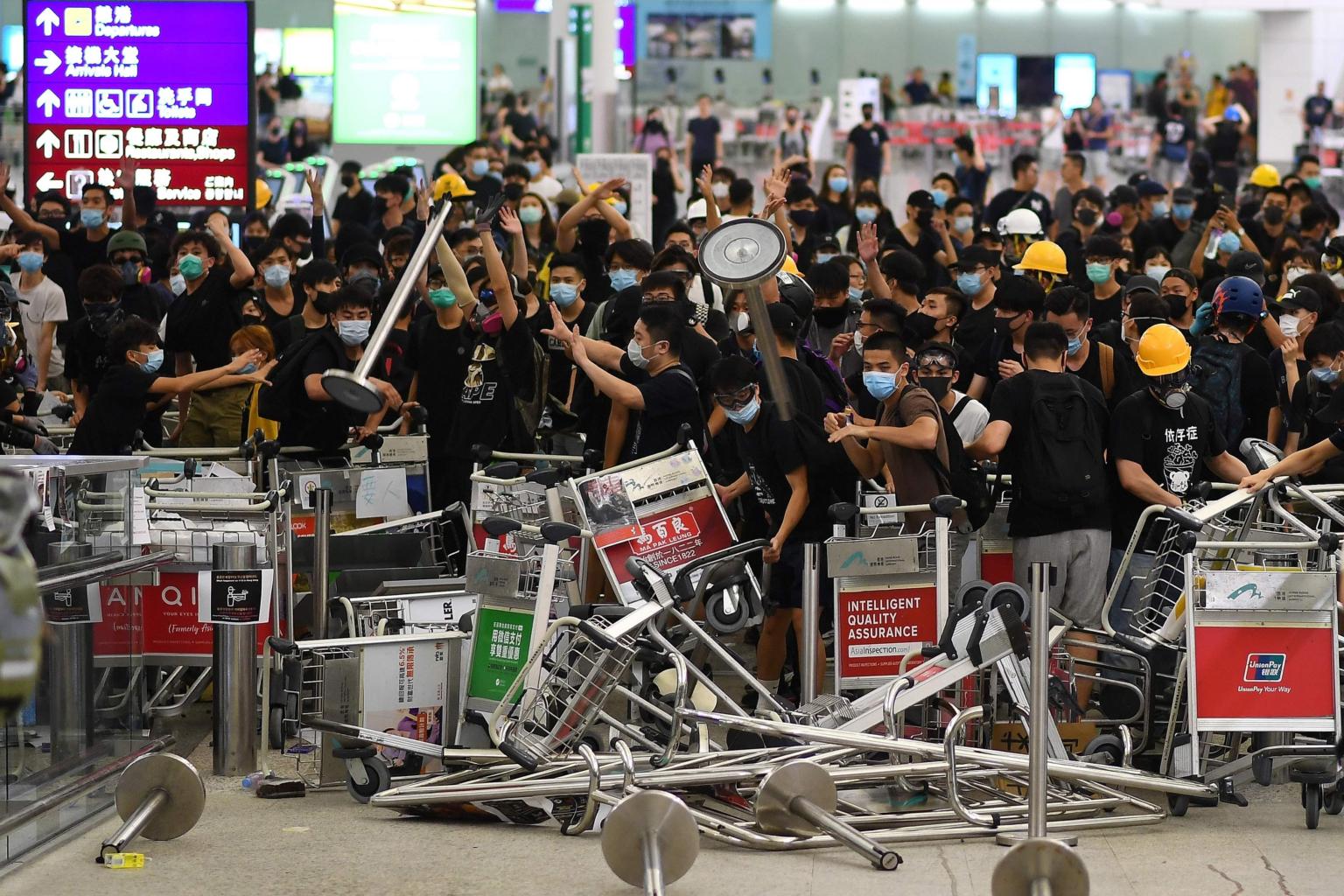From silence to 'terrorism': Beijing's evolving rhetoric on Hong Kong
Sign up now: Get insights on Asia's fast-moving developments

Pro-democracy protesters block the entrance to the airport terminals after a scuffle with police at Hong Kong's international airport on Aug 13, 2019.
PHOTO: AFP
BEIJING (AFP) - When Beijing said this week that it saw the "first signs of terrorism" among Hong Kong's young pro-democracy protesters, it marked an ominous step in a progression of escalating rhetoric.
Weeks of rallies, demonstrations and occupations have seen millions of people take to Hong Kong's streets in the biggest challenge to China's rule of the semi-autonomous city since its 1997 handover from Britain.
And as tensions between demonstrators and Hong Kong authorities intensify, so has the messaging from the central Chinese government as it seeks to shape how the protests are perceived both overseas and on the mainland, where social media and news outlets are tightly controlled.
Here's how Beijing's framing of the protests has evolved:
PRO-EXTRADITION CROWDS
On June 9, crowds bring central Hong Kong to a standstill to protest against a controversial extradition law that critics say would erode freedoms in the city.
Organisers say more than a million people marched through the streets in opposition to the Bill. State-run news agency Xinhua downplays it as a "public procession".
That evening's main news broadcast by state-run CCTV does not mention the protest, and censored searches for the demonstration on China's Twitter-like Weibo platform yield no results.
But in the following days, state media changes tactics: They de-emphasise the opposition marches and focus on support for the Bill instead.
"800,000 say 'yes' to rendition Bill," reads one China Daily piece, which describes the opposition rally as a much smaller counter protest of "about 240,000" people.
A Chinese-language People's Daily article echoes the same line, claiming "all walks of life have expressed their support for the amendment".
'EXTERNAL FORCES'
Soon after that rally, China begins blaming the protests on what it says is a small group of organisers colluding with Western governments.
In mid-June, the People's Daily accuses "external forces" of interfering in China's internal affairs - a common refrain from China's foreign ministry whenever the country faces international criticism.
This rhetoric amplifies as Western politicians throw their support behind Hong Kong protesters, whose demands to shelve the extradition Bill had evolved into a wider movement for democratic reforms.
When Britain's foreign minister calls Hong Kong chief executive Carrie Lam to voice concern about the protests, China says Britain is "stirring up trouble" in the semi-autonomous city.
At a press briefing in Beijing, Mr Yang Guang, spokesman for the Hong Kong and Macau Affairs Office of the State Council, links foreign interference with separatism.
One of their goals is to "turn Hong Kong into a base for opposing the central government and a pawn to pin down China", he tells reporters.
'VIOLENT RADICALS'
Violence in Hong Kong escalates throughout the summer and police use tear gas, rubber bullets, and batons to disperse projectile-throwing crowds.
At the end of July, anger boils over after masked men - suspected of being triad gangsters - attack protesters inside a train station.
Demonstrators, frustrated by the government's intransigence, overrun the city's legislature and vandalise the walls of Beijing's office in Hong Kong.
Chinese authorities blame a "few radicals" among protesters, while coverage of alleged police brutality is censored on the mainland.
Official state news agency Xinhua warns "violent radicals" are pushing Hong Kong into an "abyss" and says there should be no compromise to their demands.
'TERRORISM'
August sees a sharp increase in rhetoric and propaganda.
On Aug 1, the People's Liberation Army (PLA) garrison in Hong Kong releases a slick video showing armed troops practising to quell a protest.
"The primary goal would be to intimidate Hong Kong protesters by suggesting they might move in and restore 'stability' by force," said Mr Andrew Chubb, a Chinese politics and foreign policy researcher at Lancaster University.
State-run outlets like the Global Times and People's Daily circulate footage of police drills and military vehicles near the Shenzhen border in southern China.
On Tuesday (Aug 13), the day after protesters cripple Hong Kong's busy airport, Beijing's language stiffens and it says the demonstrations show "the first signs of terrorism emerging".
It repeats the charge on Wednesday, saying airport protesters are guilty of "terrorist-like actions".
"The Communist Party uses its words very carefully," said Mr Ben Bland, a research fellow at Lowy Institute.
"The choice of words in this case is designed to signal to the Hong Kong authorities that they can use a higher degree of violence and repression," he told AFP.
"It's designed to scare off the protesters by saying, 'We view this very seriously.'"


